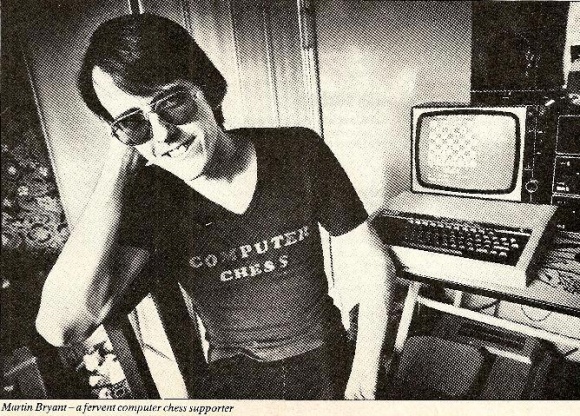Martin Bryant

Martin Bryant,
a British computer scientist, and computer chess and games programmer. In the late 70s, while affiliated with the University of Manchester and after some first chess programming trials, he got reawakened when he discovered a chess program listing on the university mainframe, a CDC Cyber 72, apparently the version of Chess 3.5 which won the ACM 1971 [2].
Inspired by that listing as well as Monty Newborn's book Computer Chess [3], Martin wrote his own chess program in Pascal, dubbed White Knight. After graduating, he started to port White Knight to 6502 Assembly for an Apple II.
He played the European MCC 1981 and soon became a professional chess and games programmer, also working for David Levy and Kevin O’Connell and their respective companies Philidor Software and Intelligent Software.
In 1983, White Knight was bought by BBC for the BBC Micro [4] [5], and Martin soon started with his mighty Colossus brand programs Colossus Chess, Colossus Draughts and Colossus Backgammon.
Contents
Checkers
Colossus Draughts won the 2nd Computer Olympiad, London 1990 in Checkers with Chinook by Jonathan Schaeffer et al. competing as well. Colossus was well prepared, since Checkers expert Martin Bryant recognized a weak opening move by Chinook played against another program one round before - which nevertheless could not find the refutation and lost, and added the winning refutation inside Colossus' opening book [6]. Martin Bryant later accepted the offer to trade Colossus' huge opening book for Chinook's six-piece databases and therefore helped Chinook to become The World Man-Machine Checkers Champion, and subsequently the offer to join the Chinook development team [7] [8]. Martin Bryant about his win at the 2nd Computer Olympiad [9]:
Paul was not playing against a group of old men who'd never seen a computer play in a competitive tournament before, but a "seasoned professional" of computer chess tournaments, where it is common practice to watch your opponents in early rounds hoping to catch them on a repeated mistake later. This has been documented to happen in computer chess tournaments so why shouldn't it happen in draughts? However, in Colossus' defense, even though I had "booked up" on the winning line, it may have been capable of finding the winning moves "across the board" anyway. After winning the game I thought to myself that it was remarkably stupid and arrogant (in the nicest possible way) of Jonathan and his team to enter a tournament with an operator who hardly knew the notation, let alone being able to recognize when his program had walked into and out of a loss! I had heard all these press "claims" by Jonathan that he'd beat the world champion in one year and solve the game in two! I had grown to love the game and knew that wasn't going to happen and so was very happy to "prove" to the world that the Chinook team still had a lot to learn about draughts.
Colossus Chess UCI
In 2004, Martin Bryant started to work on a completely new version of Colossus Chess conforming to the UCI protocol [10] .
Photos
Martin Bryant [11]
Publications
- Tony Harrington (1983). University Challenge - Martin Bryant and White Knight. Personal Computer World, August 1983, pdf hosted by Mike Watters
- Alex Bell (1983). Chess for three gives the White Knight a winning gambit. The Micro User Magazine, December 1983
- Martin Bryant (1984). Chess software for home computers. Computer & Video Games, January 1984, pdf hosted by Mike Watters
- Tony Harrington (1984). Of might and men. Personal Computer News, November 1984, pdf hosted by Mike Watters
- Jonathan Schaeffer, Rob Lake, Paul Lu, Martin Bryant (1996). Chinook: The World Man-Machine Checkers Champion. AI Magazine, Vol. 17, No. 1
Forum Posts
2002 ...
- Interview with Martin Bryant, the Man behind Colossus by Fernando Villegas, CCC, May 18, 2002
- isn't there a new version of colossus ? by Thorsten Czub, CCC, April 29, 2004
- Colossus 2007d Available by Martin Bryant, CCC, September 22, 2007
- 64-bit PGO problem? by Martin Bryant, CCC, June 27, 2008
- Correlation Experiment Results by Martin Bryant, CCC, August 13, 2008
- Colossus 2008a available by Martin Bryant, CCC, September 07, 2008
- Colossus 2008b available by Martin Bryant, CCC, September 23, 2008
2010 ...
- World Micro Computer Chess Championship 1984 photos by Martin Bryant, CCC, November 28, 2013 » WMCCC 1984
- Trying to find a weird mate in 1... by Martin Bryant, CCC, July 22, 2019 » Fieberg's mate-in-1
- You gotta love Perft... just not too much! by Martin Bryant, CCC, July 27, 2019 » Perft
2020 ...
- PERFT transposition table funny?! by Martin Bryant, CCC, April 10, 2021 » Transposition Table, Memory
- On reaching maximum ply by Martin Bryant, CCC, April 29, 2021 » Maximum Search Depth, Ply, Search
External Links
- Martin Bryant's ICGA Tournaments
- Martin Bryant from Wikipedia
- Chess Computers - The UK Story from Chess Computer UK by Mike Watters
- Interview with David Levy from schach-computer wiki
References
- ↑ Colossus - Author, Wayback Machine
- ↑ Tony Harrington (1983). University Challenge - Martin Bryant and White Knight. Personal Computer World, August 1983, pdf hosted by Mike Watters
- ↑ Monroe Newborn (1975). Computer Chess. Academic Press
- ↑ Alex Bell (1983). Chess for three gives the White Knight a winning gambit. The Micro User Magazine, December 1983
- ↑ Chess Computers - The UK Story from Chess Computer UK by Mike Watters
- ↑ Jonathan Schaeffer (1997). One Jump Ahead. 11. I Feel Like a Teenager Again, pp. 174
- ↑ Jonathan Schaeffer, Rob Lake, Paul Lu, Martin Bryant (1996). Chinook: The World Man-Machine Checkers Champion. AI Magazine, Vol. 17, No. 1
- ↑ Authors - Chinook - World Man-Machine Checkers Champion
- ↑ Martin Bryant, personal communication, August 2, 1996, published in Jonathan Schaeffer (1997). One Jump Ahead. 11. I Feel Like a Teenager Again, pp. 175
- ↑ Colossus Chess - Still life in the old horse by Bryan Whitby, CCC, October 21, 2005
- ↑ Chess Computers - The UK Story from Chess Computer UK by Mike Watters
